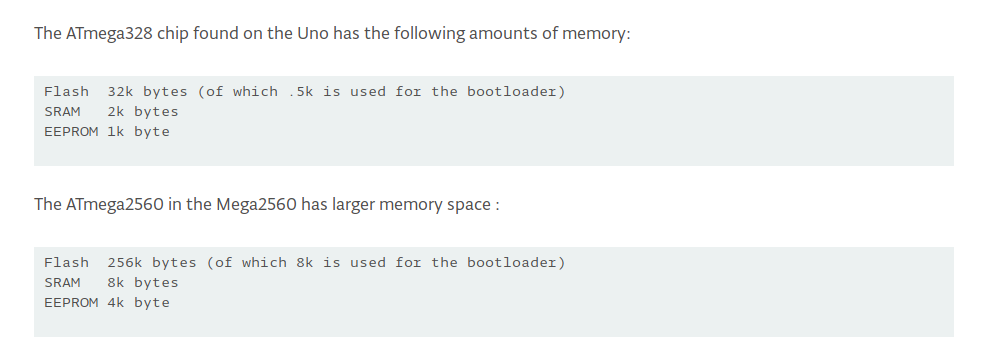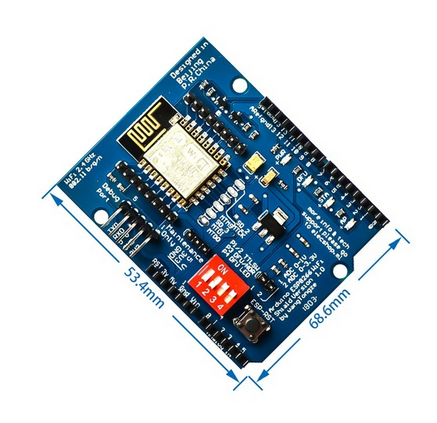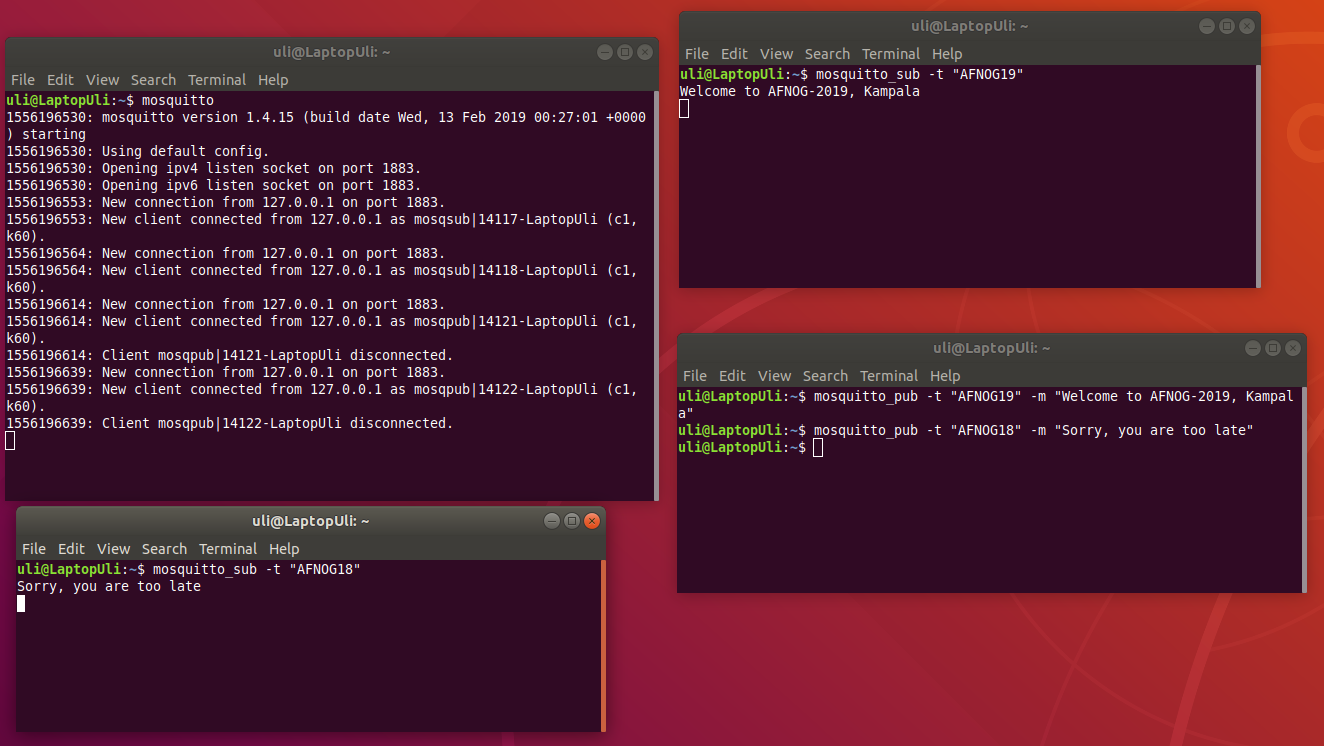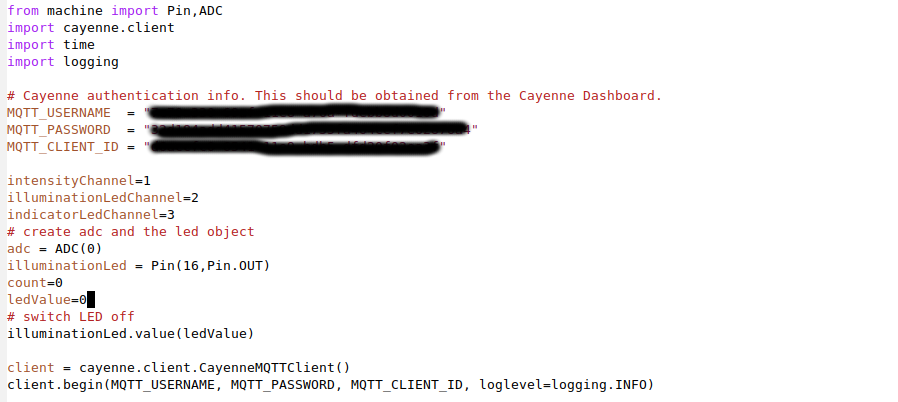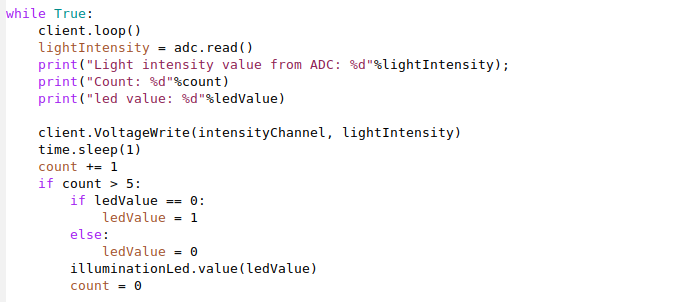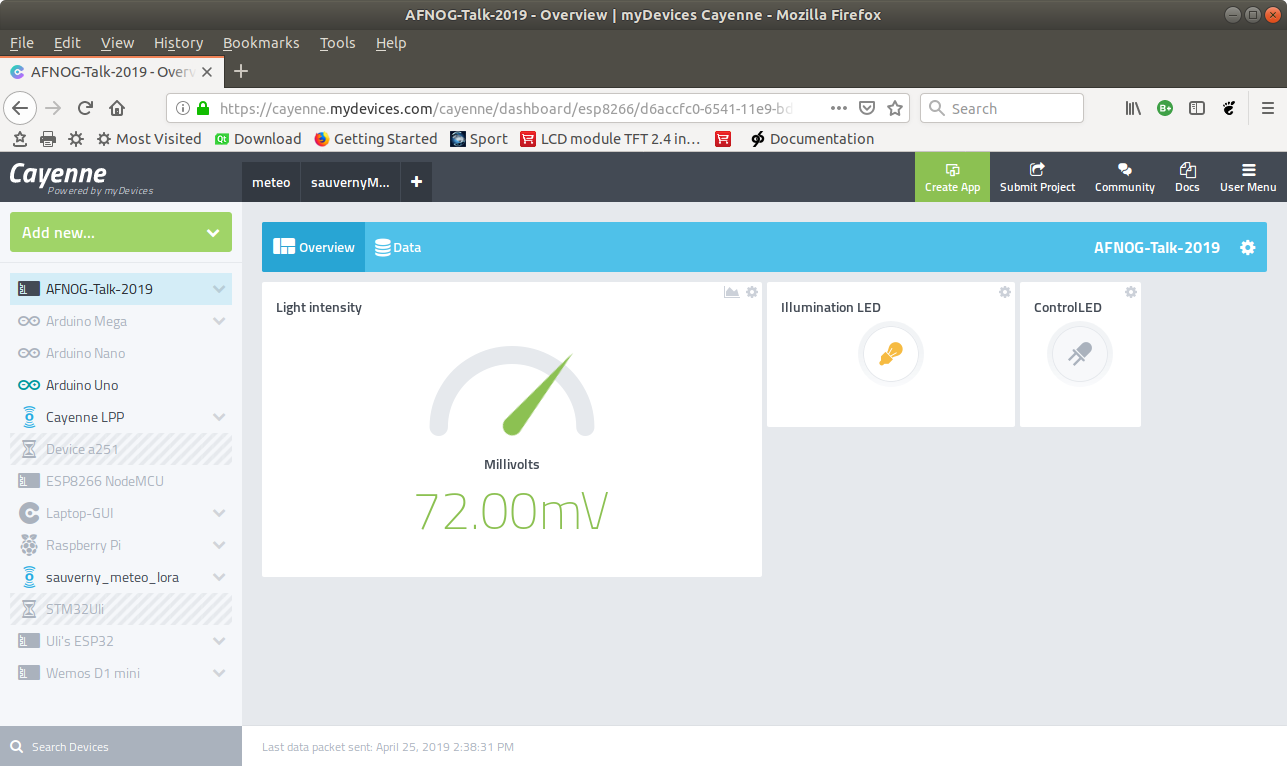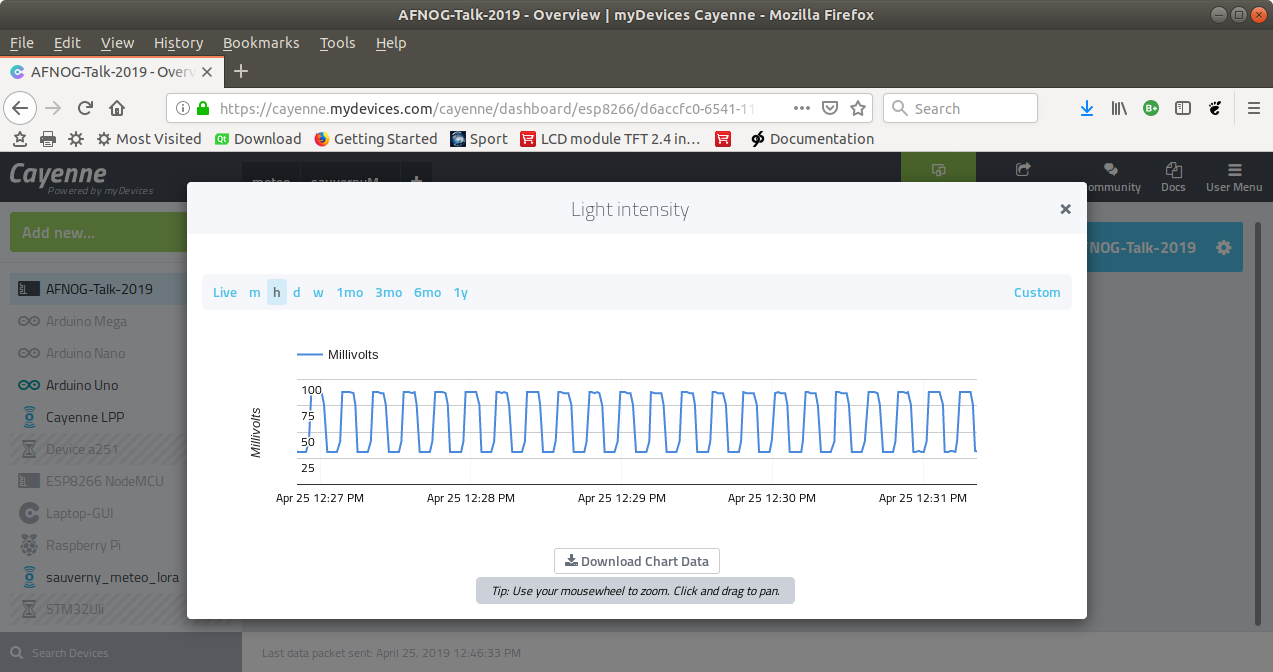
An Introduction
Uli Raich (uli.raich@gmail.com)
Formally CERN, Geneva, Switzerland
Answer: IoT is the Internet of Things
But… what is the Internet of Things?
I hate buzz-words! Everybody talks about IoT but who does deeply know, what is hidden behind the acronym. Who is able to set up an IoT by himself?
But… what is the Internet of Things?
I hate buzz-words! Everybody talks about IoT but who does deeply know, what is hidden behind the acronym. Who is able to set up an IoT by himself?
Child: “What is an elephant”
Me: An elephant is a grey animal!
Result:
Me: An elephant is a grey animal!
Result:
- The child has got an answers and does not disturb me any longer
- The child thinks that I am clever, because he thinks
I know what an elephant is (which is not true!)
- The child does not know much more than before asking
 |
 |
- Learned about elephants myself
- Told him everything about elephants I know myself:
- Where and how they live
- What they eat
- How they behave …
- Where and how they live
- Gone to the zoo (in Europe) or a nature reserve (here in East Africa)
to show him a live elephant.
The “I” stands for Internet. This means:
We need a processor (IoT node) that can connect to the Internet.
It must be powerful enough to run Internet protocols and
it needs an interface to the Internet.
We need a processor (IoT node) that can connect to the Internet.
It must be powerful enough to run Internet protocols and
it needs an interface to the Internet.
- Ethernet interface
- WiFi interface
- GSM
- … connection to a gateway with access to the internet
Usually the Internet is used by humans
Typical applications are
!IoT: “Things” communicate also without human intervention.
Typical applications are
- WEB browsing
- Email
- Social media
- Telephone and chats
!IoT: “Things” communicate also without human intervention.
- Coffee machines, dish washer, washing machine, …
- Burglar alarm system
- Intelligent farming
- Weather station
- Scientific measurements
- Industrial factory control
- Car electronics, ignition system, ABS,…
- You name it!
We need a system with a number of processors
that read out sensors and/or control actuators
These processors communicate with each other over the Internet with or without human intervention. Design decisions:
These processors communicate with each other over the Internet with or without human intervention. Design decisions:
- Which processors?
- Which communication protocol
- Which GUI to be able to see what is going on?
- Which programming language?
| The Raspberry Pi is a small computer powerful enough to run a full blown Linux operating system: A quad core 1.2 GHz Broadcom 64 bit ARM CPU
|
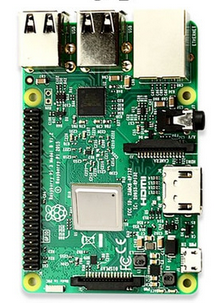 |
| ESP8266 or ESP32 processor board ESP8266 specs:
ESP32 is even more powerful Cost: ~ 4.5 US$ |
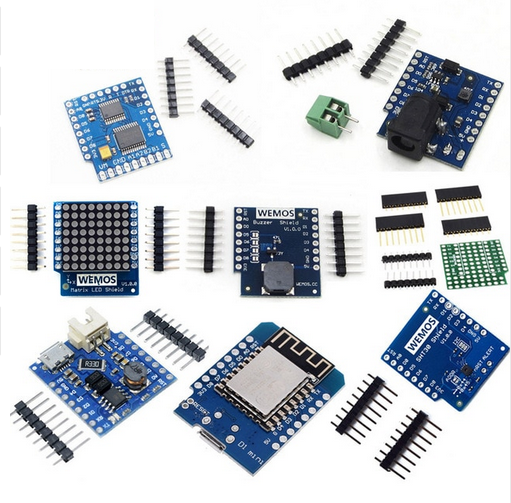 |
MQTT (Message Queuing Telemetry Transport: a publish-subscribe based
Message protocol running of top of TCP.
A processor can subscribe to messages of a certain “topic” and/or it can push its
results on a certain topic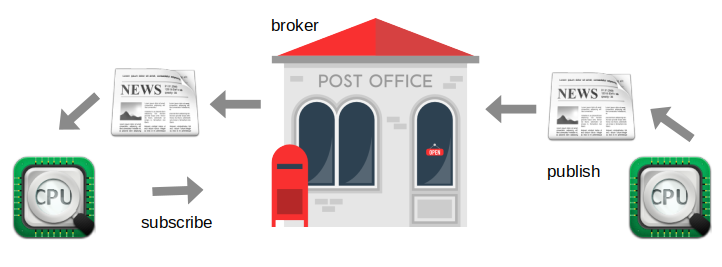
Message protocol running of top of TCP.
A processor can subscribe to messages of a certain “topic” and/or it can push its
results on a certain topic

- Only the data recovered from the communication protocol is seen
- Any programming language will do
- Cayenne/MQTT libraries are available for
- C, C++
- Python
- Java
- Java Script
- C, C++
The photo resistor and the 1 kΩ resistor form a voltage divider
The LED can be switched on by program and changes the light
Intensity seen by the photo resistor
The LED can be switched on by program and changes the light
Intensity seen by the photo resistor
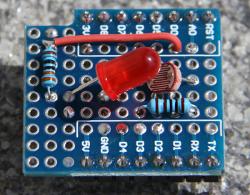 |
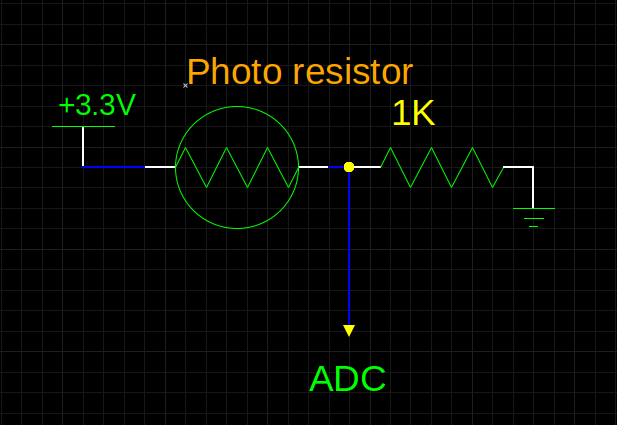 |
|
The ADC and GPIO driver classes
are already available in micropython. This makes readout a child’s game. | 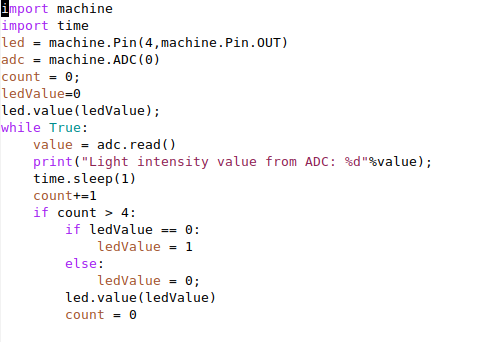 |
- Cayenne supplies the MQTT broker
- It uses a dedicated format for “topic” and “payload”
- We hide these details in a “Cayenne” Python class
- Cayenne supplies widgets for display and control
Unfortunately you missed the workshop on IoT at this conference
But you may have a look at its Twiki server
http://afnog.iotworkshop.africa
… or have a beer with me at the bar!
But you may have a look at its Twiki server
http://afnog.iotworkshop.africa
… or have a beer with me at the bar!



--
Comments
| I | Attachment | History | Action | Size |
Date | Who | Comment |
|---|---|---|---|---|---|---|---|
| |
photoresistorSchema.png | r1 | manage | 18.2 K | 2019-06-06 - 08:29 | UliRaich | |
| |
post-office.png | r1 | manage | 19.7 K | 2019-05-27 - 13:35 | UliRaich | |
| |
arduinoSpecs.png | r1 | manage | 27.2 K | 2019-05-27 - 13:22 | UliRaich | |
| |
protoDriver.png | r1 | manage | 31.4 K | 2019-05-27 - 13:45 | UliRaich | |
| |
cayennePublish.png | r1 | manage | 36.8 K | 2019-05-27 - 14:03 | UliRaich | |
| |
mqttPostOfffice.png | r1 | manage | 50.2 K | 2019-05-27 - 13:39 | UliRaich | |
| |
cayenneDefs.png | r1 | manage | 60.1 K | 2019-05-27 - 14:03 | UliRaich | |
| |
proto.png | r1 | manage | 114.2 K | 2019-05-27 - 13:43 | UliRaich | |
| |
cayenneProtoHistory.png | r1 | manage | 114.5 K | 2019-05-27 - 14:08 | UliRaich | |
| |
cayenneProtoResult.png | r1 | manage | 115.8 K | 2019-05-27 - 14:08 | UliRaich | |
| |
cayenneStart.png | r1 | manage | 146.3 K | 2019-05-27 - 13:17 | UliRaich | |
| |
rpiBoard.png | r1 | manage | 148.6 K | 2019-05-27 - 13:17 | UliRaich | |
| |
mqttDemo.png | r1 | manage | 191.3 K | 2019-05-27 - 13:36 | UliRaich | |
| |
wifishield.png | r1 | manage | 200.8 K | 2019-05-27 - 13:17 | UliRaich | |
| |
cayenne.png | r1 | manage | 221.2 K | 2019-05-27 - 13:17 | UliRaich | |
| |
mega.png | r1 | manage | 258.9 K | 2019-05-27 - 13:17 | UliRaich | |
| |
shields.png | r1 | manage | 388.3 K | 2019-05-27 - 13:36 | UliRaich | |
| |
elephant.png | r1 | manage | 453.3 K | 2019-05-27 - 12:42 | UliRaich | |
| |
child.png | r1 | manage | 772.4 K | 2019-05-27 - 12:42 | UliRaich | |
| |
protoBoard.png | r1 | manage | 882.8 K | 2019-05-27 - 13:36 | UliRaich |
This topic: AFNOG > WebHome > AFNOGWorkshop2019 > AFNOG-2019Slides > Talk > Slides_WhatIsNopIoT
Topic revision: r2 - 2019-06-06 - UliRaich
Ideas, requests, problems regarding TWiki? Send feedback



